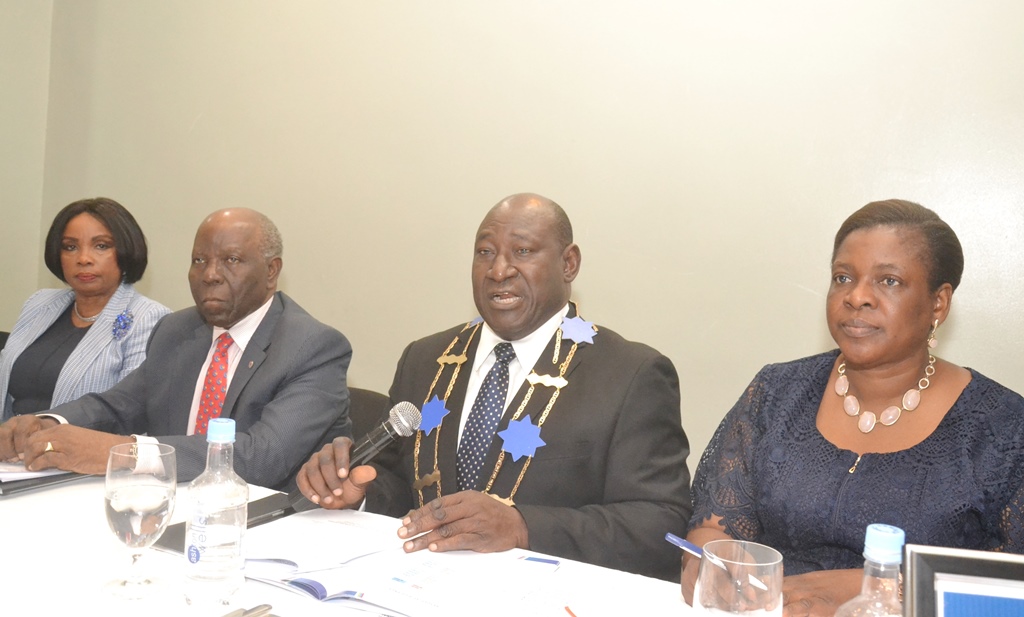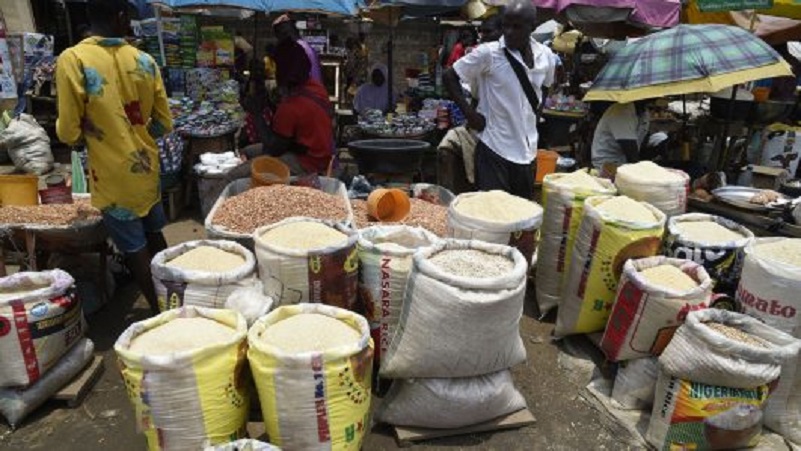Economy
Nigeria Must Act Fast to Avert Serious Food Disaster—ICC Nigeria

The need for federal government of Nigeria and every other stakeholder to devise a means of feeding the nation now and in years to come so as to avert serious food disaster in the country has been emphasised by Chairman of the International Chamber of Commerce (ICC) Nigeria, Mr Babatunde Savage.
Speaking at the 20th Annual General Meeting (AGM) of the ICC Nigeria/Post-AGM Lecture held at Southern Sun Hotel, Ikoyi-Lagos on Thursday, Mr Savage, who is also the Regional Coordinator of the global body for Sub-Saharan Africa, further stressed that food security was very germane to the country’s situation because it forms a core plank upon which the economic recovery and growth plan of the incumbent administration is anchored.
With an average population growth of 2.6 percent between 2010 and 2019, the United Nation Population Fund (UNFPA) had recently disclosed that Nigeria now has a population of about 201 million. The UNFPA unveiled this estimate in its 2019 State of the World Population report.
The report said that Nigeria’s population grew by about 5 million people from 2018 when the country’s population was 195.9 million. “The country has witnessed a population growth from 54.7 million in 1969 to 105.4 million in 1994 and 201.0 million in 2019”, the UNFPA stated.
He warned that the fact that the Accelerated Agricultural Development Scheme (AADS), a transformational initiative by the President Muhammadu Buhari-administration is currently delivering on its set objectives and goals is not enough for us as a nation to relax.
According to him, the explosion expected in the population in the years to come; particularly if the degree of increase in food production in Nigeria does not commensurate with the trend must be envisaged and planned for now.
Corroborating the remarks made by the ICC Nigeria boss, the guest lecturer, Dr Victor Ajieroh, Senior Programmes Officer, Nutrition Nigeria, Bill & Melinda Gates Foundation, asserted that food systems are very important to his organization because the Foundation believes that all lives have equal value.
According to him, every efficient food system should be able to deliver high quality diet and affordable nutrition; be inclusive, efficient and sustainable; as well as be resilient, sustainable and be able to take shocks.
Mr Ajieroh explained that every high-quality diet should be able to eliminate hunger, reduce all forms of malnutrition and promote sound health. Anything short of this, he stated, is an indication that the food system quality is nothing to write home about.
He revealed that with his experience at Bill & Melinda Gates Foundation, many food systems globally are yet to produce high quality diets, an instance he said requires an urgent attention by all stakeholders.
His words: “Our food systems are not yet producing high quality diets, as one in every three people worldwide are currently malnourished.”
However, he acknowledged that the scenarios are not constant as the global and local food systems regularly change as a result of policy interventions from governments and businesses.
Mr Ajieroh stated that the required interventions in the food systems should not be treated as an exclusive responsibility of each government; rather he said all stakeholders should see it as an inclusive responsibility.
He specifically charged businesses to consider themselves as part of the problem the society is facing with regards to food supply as well as part of the solution to tackle the menace.
Meanwhile, Mr Savage also bemoaned the poor transportation infrastructure in Nigeria, as he stated that the efforts being made by the current administration has not yielded the desired result. He complained that over 50% of the federal and state roads across the country are still in poor conditions.
He stated that, “This scenario does not depict any level of seriousness expected if we must, as a country, achieve the earmarked goals of the Transformation Agenda.”
Concerning security of life and property, he commended the efforts of the Federal Government, particularly the Police and other security agencies towards reducing crime rates in the country.
However, Mr Savage said ICC Nigeria has observed that the country has continued to witness insecurity in diverse forms.
He said, “The business environment has remained hostile due to illegal touting activities by hoodlums, armed robbery, kidnapping activities, vandalisation of major oil and gas pipelines in the Niger Delta; Boko Haram insurgency in the North East, and banditry in the North West. We cannot continue this way, we need to ensure that peace prevails and become the order of the day to usher in economic prosperity in Nigeria.”
The post-AGM lecture of the ICC Nigeria, which was themed The Future of Food System, was part of the activities used to mark the regional programmes for the 100th anniversary of the ICC worldwide and the 20th anniversary of the re-organization of ICC Nigeria.
Other board members present at the event are: Chief Olusegun Osunkeye, Chairman Emeritus; Chef Raymond Ihyembe, Vice Chairman; Mrs Dorothy Ufot, Treasurer; Mr Segun Olugboyegun, Member and Mrs Olubunmi Osunkeye, Secretary General.
Economy
Champion Breweries Concludes Bullet Brand Portfolio Acquisition

By Aduragbemi Omiyale
The acquisition of the Bullet brand portfolio from Sun Mark has been completed by Champion Breweries Plc, a statement from the company confirms.
This marks a transformative milestone in the organisation’s strategic expansion into a diversified, pan-African beverage platform.
With this development, Champion Breweries now owns the Bullet brand assets, trademarks, formulations, and commercial rights globally through an asset carve-out structure.
The assets are held in a newly incorporated entity in the Netherlands, in which Champion Breweries holds a majority interest, while Vinar N.V., the majority shareholder of Sun Mark, retains a minority stake.
Bullet products are currently distributed in 14 African markets, positioning Champion Breweries to scale beyond Nigeria in the high-growth ready-to-drink (RTD) alcoholic and energy drink segments.
This expansion significantly broadens the brewer’s addressable market and strengthens its revenue base with an established, profitable portfolio that already enjoys strong brand recognition and consumer loyalty across multiple markets.
“The successful completion of our public equity raises, together with the formal close of the Bullet acquisition, marks a defining moment for Champion Breweries.
“The support we received from both existing shareholders and new investors reflects strong confidence in our long-term strategy to build a diversified, high-growth beverage platform with pan-African scale.
“Our focus now is on disciplined execution, integration, and delivering sustained value across markets,” the chairman of Champion Breweries, Mr Imo-Abasi Jacob, stated.
Through this transaction, Champion Breweries is expected to achieve enhanced foreign exchange earnings, expanded distribution leverage across African markets, integrated supply chain efficiencies, portfolio diversification into high‑growth consumer beverage categories, and strengthened presence in the RTD and energy drink segments.
The acquisition accelerates Champion Breweries’ transition from a regional brewing business to a multi-category consumer platform with continental reach.
Bullet Black is Nigeria’s leading ready-to-drink alcoholic beverage, while Bullet Blue has built a strong presence in the energy drink category across several African markets.
Economy
M-KOPA Nigeria Plans Expansion to Edo, Others After N231bn Credit Milestone

By Adedapo Adesanya
Emerging market fintech firm, M-KOPA, has announced plans to deepen its reach in Nigeria to the South South and South East regions, starting with Edo this year, after providing N231 billion in credit to over 1 million customers in the country.
The firm released its first Nigeria-focused Impact Report, which showed that Nigeria is M-KOPA’s fastest-growing market and fastest to reach the milestone.
Since its foray into the Nigerian market in 2019, M-KOPA has been working to dismantle barriers to financial inclusion by providing flexible smartphone financing and digital financial tools that align with how people in the informal economy earn and manage their money.
It operates in six states in the country, including Lagos, Ogun, and Oyo, among others.
The report highlights the company’s contribution to income generation, digital inclusion and economic opportunity for Every Day Earners across the country.
The report showed that M-KOPA has enabled 290,000 first-time smartphone users, while 56 per cent of agents accessed their first income opportunity through the platform.
It showed high income and livelihood gains among its users, with about 77 per cent of customers leveraging smartphones or digital loans obtained through the platform to generate income, indicating that access to financed devices is directly supporting micro-entrepreneurial activity and informal sector productivity.
Furthermore, 75 per cent of users report higher earnings since gaining access to M-KOPA’s services, suggesting measurable improvements in personal revenue streams. On the distribution side, 99 per cent of agents disclose increased earnings, reflecting positive spillover effects across the company’s value chain.
In addition, 81 per cent of long-term customers state that their household expenses have improved, pointing to enhanced financial stability and better consumption smoothing over time.
Speaking on the report, Mr Babajide Duroshola, General Manager, M-KOPA Nigeria, said, “Nigeria represents extraordinary potential, and we’re proud that it has become M-KOPA’s fastest-growing market. Our Impact Report shows that when Every Day Earners gain access to the right digital and financial tools, they use them to create stability and long-term progress for their families. This is about access that unlocks opportunity and sustained prosperity.”
On its expansion plans Nigeria-wide, the M-KOPA helmsman said, “Many of the states we are considering are already similar to the ones we are currently in proximity… So, there is proximity and similarity between these states, and that’s what we are going to do, starting with Edo.”
He noted that as M-KOPA Nigeria continues to expand, the focus remains on ensuring more everyday earners gain access to the digital and financial tools they need to build resilient, prosperous futures in Nigeria’s rapidly digitising economy.
Economy
Tinubu Okays Extension of Ban on Raw Shea Nut Export by One Year

By Aduragbemi Omiyale
The ban on the export of raw shea nuts from Nigeria has been extended by one year by President Bola Tinubu.
A statement from the Special Adviser to the President on Information and Strategy, Mr Bayo Onanuga, on Wednesday disclosed that the ban is now till February 25, 2027.
It was emphasised that this decision underscores the administration’s commitment to advancing industrial development, strengthening domestic value addition, and supporting the objectives of the Renewed Hope Agenda.
The ban aims to deepen processing capacity within Nigeria, enhance livelihoods in shea-producing communities, and promote the growth of Nigerian exports anchored on value-added products, the statement noted.
To further these objectives, President Tinubu has authorised the two Ministers of the Federal Ministry of Industry, Trade and Investment, and the Presidential Food Security Coordination Unit (PFSCU), to coordinate the implementation of a unified, evidence-based national framework that aligns industrialisation, trade, and investment priorities across the shea nut value chain.
He also approved the adoption of an export framework established by the Nigerian Commodity Exchange (NCX) and the withdrawal of all waivers allowing the direct export of raw shea nuts.
The President directed that any excess supply of raw shea nuts should be exported exclusively through the NCX framework, in accordance with the approved guidelines.
Additionally, he directed the Federal Ministry of Finance to provide access to a dedicated NESS Support Window to enable the Federal Ministry of Industry, Trade and Investment to pilot a Livelihood Finance Mechanism to strengthen production and processing capacity.
Shea nuts, the oil-rich fruits from the shea tree common in the Savanna belt of Nigeria, are the raw material for shea butter, renowned for its moisturising, anti-inflammatory, and antioxidant properties. The extracted butter is a principal ingredient in cosmetics for skin and hair, as well as in edible cooking oil. The Federal Government encourages processing shea nuts into butter locally, as butter fetches between 10 and 20 times the price of the raw nuts.
The federal government said it remains committed to policies that promote inclusive growth, local manufacturing and position Nigeria as a competitive participant in global agricultural value chains.
-

 Feature/OPED6 years ago
Feature/OPED6 years agoDavos was Different this year
-
Travel/Tourism10 years ago
Lagos Seals Western Lodge Hotel In Ikorodu
-

 Showbiz3 years ago
Showbiz3 years agoEstranged Lover Releases Videos of Empress Njamah Bathing
-

 Banking8 years ago
Banking8 years agoSort Codes of GTBank Branches in Nigeria
-

 Economy3 years ago
Economy3 years agoSubsidy Removal: CNG at N130 Per Litre Cheaper Than Petrol—IPMAN
-

 Banking3 years ago
Banking3 years agoSort Codes of UBA Branches in Nigeria
-

 Banking3 years ago
Banking3 years agoFirst Bank Announces Planned Downtime
-

 Sports3 years ago
Sports3 years agoHighest Paid Nigerian Footballer – How Much Do Nigerian Footballers Earn


















